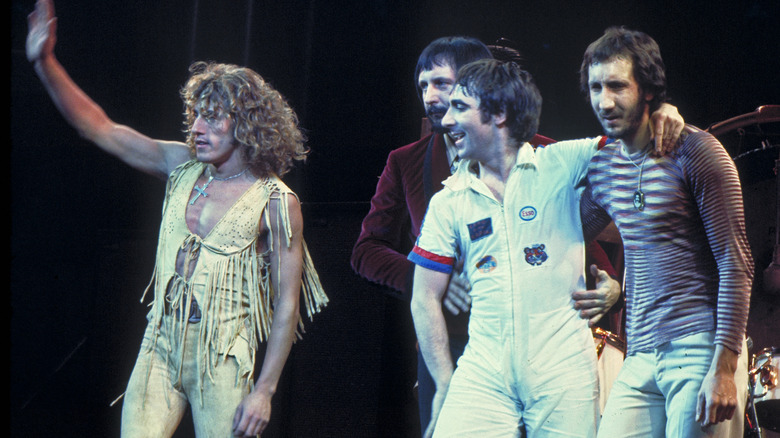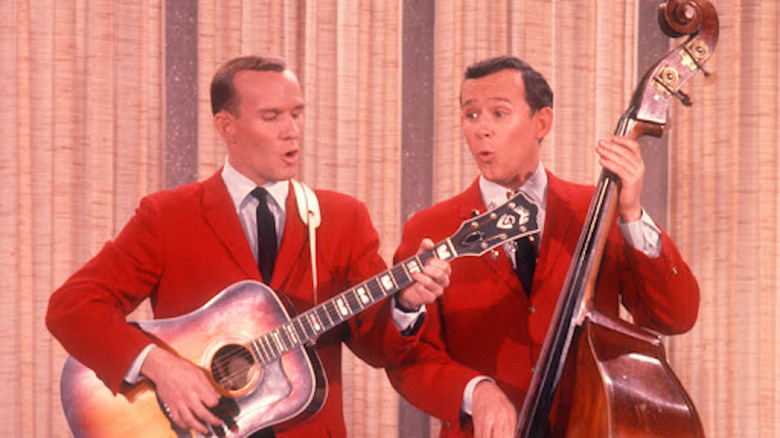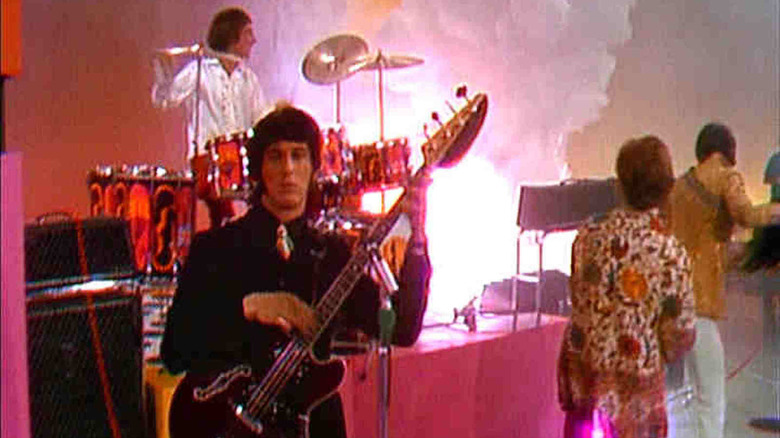The Who Created An Explosion On 60s TV That Caused Injury And Panic
It was the fall of 1967. The Summer of Love had just drawn to a close. Teens and twentysomethings, when they weren't studying or punching the clock, were down for a revolution. They wanted to change the world, and, in the process, cheese off their parents. And there was no better way to accomplish the latter than to switch on "The Smothers Brothers Comedy Hour."
Dick and Tom Smothers didn't look like troublemakers, but their CBS variety show had quickly become an annoyance for the so-called "Tiffany Network." They were a hit with their target demographic, which was, ironically, the problem. Their hip young writing staff was relentlessly satirizing the increasingly uneasy state of the world, which didn't sit well with advertisers or politically conservative executives. And while it was far from provocative to book edgy musical acts (Steve Allen, Ed Sullivan, and Dean Martin had been doing so since the late 1950s), the artists appearing on the Smothers' show were getting young folks to question authority (CBS's "The Twilight Zone" also did that for five seasons, but the network evidently didn't realize this.)
The first salvo in a war that would end with the cancellation of "The Smothers Brothers Comedy Hour" in 1969 was fired on September 10, 1967, when Pete Seeger's performance of "Waist Deep in the Big Muddy," a protest song that unsubtly questioned the wisdom of the Vietnam War, was dropped from that evening's episode. The network wasn't looking to take a political stance at a moment when public sentiment was turning against the conflict, and they were furious with Seeger's refusal to censor his own song.
Had the Smothers Brothers been concerned with their show's longevity, they might've eased their foot off the counterculture gas on September 17, 1967. Instead, they booked The Who.
Never tell The Who they need to make a bigger boom
The Who were not a terribly political band. They were, however, loud. Really freaking loud. And this, in itself, was something of a political statement in 1967.
The Who had just scored their first big hit in the United States with "I Can See for Miles," establishing themselves as a straight-ahead rock band at a time when the genre's biggest acts (e.g. The Beatles and The Rolling Stones) were diving headlong into psychedelia. The Who would hit their heady concept album phase in due time, but for the moment all they wanted to do was raise a sonic ruckus.
And what better way to do this than to set off an explosion at the end of their performance on "The Smothers Brothers Comedy Hour"?
In The Hollywood Reporter's 2017 oral history of the show's rocky three seasons on the air, the Smothers and their creative associates said The Who approached them about blowing up Keith Moon's drum kit at the conclusion of "My Generation." The Smothers signed off on the idea, but, during rehearsal, were mightily underwhelmed by The Who's idea of an explosion. They wanted something bigger. So did The Who. But while they were both on the same page, they didn't communicate this to each other.
According to producer-writer Allan Blye, "In dress rehearsal, it was a powder puff. So, I say to the special effects guy, 'We have to make a bigger boom.' Unbeknownst to us, The Who had told their own guy the same thing."
What happened next made television history (and left guitarist Pete Townshend partially deaf).
'I thought there was going to be dead bodies'
The entire performance is available to stream on YouTube, and, over 50 years later, it still lives up to the hype. When Moon's over-primed bass drum blows, the band is completely staggered. Moon gets blown off the drum stand, while Townshend is left utterly dazed.
What happened next was roughly rehearsed bedlam. As Tommy Smothers told The Hollywood Reporter:
"The bit was supposed to end with Townshend smashing my guitar. There was shrapnel everywhere. I thought there was going to be dead bodies. Pete staggers over to me, shell-shocked. He takes my guitar and starts banging it. Everyone assumed this wasn't part of the act because I was looking around panicked. It was a real authentic moment. One of the great moments in rock 'n' roll."
Alas, the best reaction to the performance occurred offstage. Per Dick Smothers:
"I was standing in the wings with Bette Davis, watching. The rumor was that she fainted when she heard the blast. Bette Davis could see an atom bomb go off and wouldn't faint. I don't even know if she blinked. She finished her cigarette, probably stepped on it and said, 'Well, that was a good bang.' She was so cool."
So while parents were disgusted by The Who's chaotic display, the 59-year-old movie star they'd grown up adoring was turned on. Mildly. It doesn't get any cooler, or more subversive, than that. Perhaps George Clooney and Grant Heslov can recreate this moment if they ever get around to making their Smothers Brothers biopic. And while we're making wishes, maybe Pete Townshend can make his version of "The Iron Giant" one of these days.


